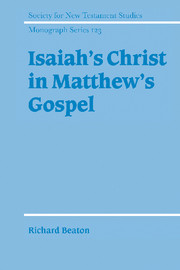Book contents
- Frontmatter
- Contents
- Preface
- List of abbreviations
- 1 Introduction
- 2 History of research
- 3 Texts and early Jewish exegesis
- 4 Isaianic formula quotations in Matthew
- 5 Isaiah 42.1–4 within the context of Matthew 11–13
- 6 The christological contribution of Isaiah 42.1–4
- 7 Conclusion
- Bibliography
- Index of passages
- Index of modern authors
- Index of subjects
1 - Introduction
Published online by Cambridge University Press: 22 September 2009
- Frontmatter
- Contents
- Preface
- List of abbreviations
- 1 Introduction
- 2 History of research
- 3 Texts and early Jewish exegesis
- 4 Isaianic formula quotations in Matthew
- 5 Isaiah 42.1–4 within the context of Matthew 11–13
- 6 The christological contribution of Isaiah 42.1–4
- 7 Conclusion
- Bibliography
- Index of passages
- Index of modern authors
- Index of subjects
Summary
Ensconced in Maimonides' Commentary of the Mishnah Tractate Sanhedrin between comments concerning the fundamental tenets of the Jewish faith and his well-known thirteen fundamental principles is a brief section on the days of the messiah. Somewhat surprisingly, Maimonides (AD 1135–1204) cites Isa. 42.4a to validate the proposition that following an extended reign the messiah will die. A translation reads as follows:
And the Messiah will die, and his son will reign in his stead and then his grandson. God has already predicted his death in the verse,
'He shall not fail nor be crushed,
till he have set the right in the earth.'
Maimonides' usage provides but one, albeit late, example of Jewish messianic exegesis of Isa. 42.1–4. That he would appeal to this text in support of his understanding of the days of the messiah is not unexpected given its long history of usage within Jewish messianic thought. What is rather unusual, however, is that he would cite Isa. 42.4a to validate the messiah's death.
Engaging in a messianic exegesis of his own nearly a millennium before, the author of the Gospel of Matthew also cites Isa. 42.1–4; however, in Matthew's version of the text in 12.18–21, the reference to weakness and perhaps even death found in Isa. 42.4a is absent. This line of text has been excised from Matthew's version of Isa. 42.4a (Matt. 12.20b) and an unknown piece of text inserted in its place (see the passages below).
- Type
- Chapter
- Information
- Isaiah's Christ in Matthew's Gospel , pp. 1 - 13Publisher: Cambridge University PressPrint publication year: 2002



